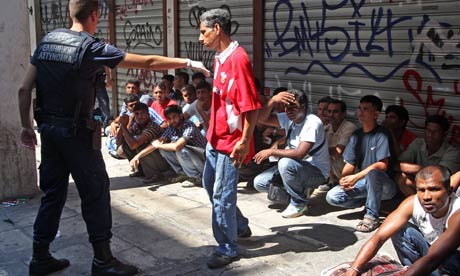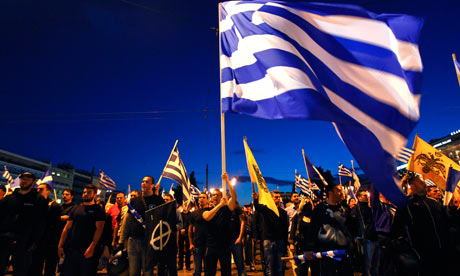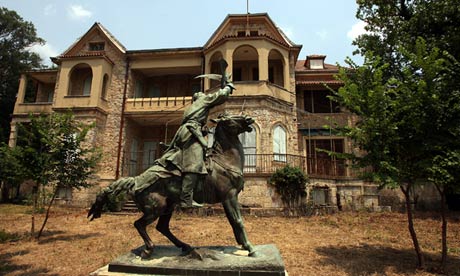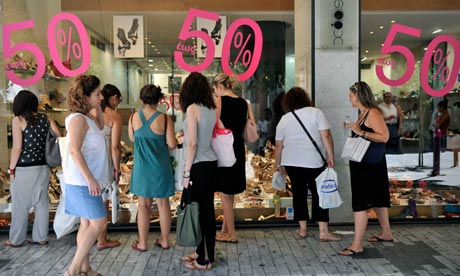By Nick Malkoutzis

Is there another euro zone country where you can witness a finance minister being barracked on his way into the office? Few of Yiannis Stournaras’s counterparts will experience the kind of close encounters he did last week as he was harangued by protesting steel workers on his walk to the Finance Ministry in central Athens. Stournaras remained calm, hardly quickening his step, but was left in no doubt about the exasperation of his sidewalk critics.
Perhaps Stournaras would have felt aggrieved to hear shouts of “You’ve destroyed us” given that he has only held his position for a few weeks. But the abuse was not personal, it was purely business. The trading of blame and frustration is one of the few activities still flourishing in this seemingly moribund country. For the protesters, Stournaras was simply the representative of a political system that has watched helplessly and acted haplessly as Greece slides into decline.
He is one of the many targets of abuse in Athens these days. The latest round of negotiations between the government and the troika on the cuts demanded to secure further bailout instalments have brought back with a vengeance the sense of insecurity that has lingered over the country for the last three years. A fresh tug-of-war between Athens and its lenders is eroding the little confidence left. More talk of measures that have a direct and immediate impact on people’s livelihoods push further away any thoughts of stability or recovery.
In this climate, it is no surprise that the three-party coalition is treading carefully, reluctant to accept all of the troika’s demands and perhaps providing more counter-arguments on the specific cuts that should be made than the past. Despite coming in the wake of almost 50 billion Euros of measures since the crisis began, this package of 11.5 billion in reductions and 2 billion Euros in tax hikes is going to be the most painful of all.
For starters, the survival of the coalition - delicately balanced on the precipice created by the jolting of the political fault lines in this summer’s elections - depends upon being able to manage the new batch of measures. The parties each have to convince their supporters that there is good reason to abandon their pre-election pledges of renegotiating the bailout. Collectively, they have to convince the Greek public that further cuts are part of a winning strategy to lift an economic that has shrunk by about a fifth since 2008 out of its near comatose state.
This task is most difficult for Democratic Left Fotis Kouvelis. His party promised to hold back the reins of the troika but he finds himself being dragged through the thorny bushes of an intense fiscal adjustment. Three of his 17 MPs have already declared they will vote against the measures. Should this number rise by several more, the existence of Kouvelis’s party would surely be in doubt.
PASOK, battered from pillar to post at the recent elections, has no wish to sign its death warrant by associating itself with more brutal measures. In fact, its leader Evangelos Venizelos wants to distance himself as much as possible from the even deeper cuts to salaries, pensions and benefits that the troika has apparently demanded. His only hope of survival is that the worst of what is in this latest package is associated with Prime Minister Antonis Samaras and Stournaras rather than himself and Kouvelis. This seems one of the few ways PASOK, currently fourth in the polls behind neofascist Golden Dawn, could stop its slide into oblivion.
For Samaras, for so long the self-styled anti-austerity warrior, an excessive cut to wages and pensions would be morally and ideologically devastating. He will have difficulty reconciling the 11.5 billion Euros in cuts as things stand. If the troika force him and his party to abandon their long-held claims that some savings could be made from reforming the public sector, not just by cutting people’s earnings, the core thrust of his economic argument would implode.
A coalition unable to hold on to even a modicum of its original positions would be left with nowhere to go, even after just a few months in government. But political survival is only one aspect of Greece’s predicament; society’s survival remains the key factor.
The reason that the coalition is standing on shaky ground is because society is restless. On Wednesday, tens of thousands of people will march through the centre of Athens. One in four of those protesting will be unemployed, while one in three of the shops they pass will have shut down due to the crisis. Some will argue that is part of the process of creative destruction, or a necessary by-product of the internal devaluation, that Greece is undergoing. But three years into the crisis, the majority of Greeks have seen plenty of destruction but little in the way of creativity. Greece has reached the point of internal default, with the state refusing to pay some suppliers and reportedly attempting to strong-arm others into accepting a sizeable discount.
This is the result of a flawed adjustment program that failed to identify and prioritize key structural reforms and bailout that is recycling debt that an economically crippled Greece has little hope of paying. The only thing being created by one of the biggest post-Second World War fiscal consolidations ever seen is a complex of dead-ends: a country that can’t satisfy its lenders, an economy that is stuck in decline, a people running out of options and the absence of a way out.
In this atmosphere, it is perplexing that the troika, and the International Monetary Fund, in particular has chosen to intensify its dogmatism. Reports that the IMF’s representative Poul Thomsen rejected the savings Greece planned to make from structural reforms and demanded further cuts to wages and pensions suggest a troika that is oblivious to the political and social dangers of the consolidation program.
Some have interpreted this as an intentional manoeuvre by the IMF, which wants to make the Europeans face up to the fact that Greek debt is not sustainable and that the officials sector – the European Central Bank and the euro zone – will have to accept some form of restructuring. While the issue needs to be addressed, the IMF’s crude way of forcing it onto the negotiating table – if that is what the Fund is doing – is a high risk strategy.
There is a world of difference between the Europeans discussing a new restructuring for Greece because austerity is becoming counter-productive and them being forced to give Athens another break because it lacks the political courage to pass more cuts. Over the last few days, the failure to agree on the latest austerity package with the troika has led to some in Europe having the impression that the latter is the case. Reports confusing fiscal and financing gaps have created the impression that Greece will suddenly need to borrow 30 billion Euros more, thereby strengthening the impression that it is the so-called bottomless pit that some have suggested. Nowhere has it been made clear that as of next year, any money that Greece will be borrowing will be going towards paying debt, not to cover public expenditure.
See, for instance, the reaction of Michael Meister, a Christian Democratic Union MP in Germany, to suggestions that there should be a further write-down of Greek debt. “Where would it stop? We’re talking about loans from as recently as last year,” he told Bloomberg, before adding that it was “up to the Greeks” to make up any financing gaps.
The troika is due to return to Athens this week and some compromise is likely to be found but the fundamentals of the problem will remain. Agreeing the new austerity package will not resolve Greece’s situation and somehow all sides have to find their way out of the corners into which they’ve backed themselves into.
One factor that may play a part in concentrating minds is the apparent changing dynamic in Portugal, which as the Economist put it, has “in two short weeks gone from being a model pupil... to a cautionary example of the dangers facing governments which attempt to push austerity beyond the tolerance of long-suffering voters.” The Portuguese government buckled last week under public pressure over its decision to increase workers’ social security contributions, while cutting them for employers. This may end up being a landmark moment for the European debt crisis, as protests in Greece and Spain intensify.
The hope for Greece is that the limits to austerity and what it can achieve are becoming ever more visible to Europeans and that a more comprehensive method of tackling the crisis will be sought. Otherwise, a slow death, by 11.5 billion cuts lies ahead.
[Kathimerini English Edition]
![The [Greek] European Tragedy](http://3.bp.blogspot.com/-OSMAuv1xvEY/UUpsO5__BaI/AAAAAAAABsg/DZGqo9w12Ek/s920/GkBack_new.jpg)




;)





